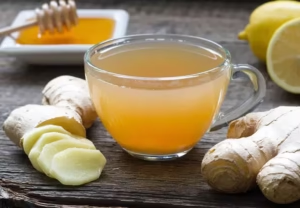Many people reach for store-bought medicine as the first solution to minor health problems. While modern medicine plays an important role, you may be surprised to learn that your kitchen holds a variety of natural remedies that can help with everyday ailments. These ingredients have been used for centuries for their healing properties, and most of them are inexpensive and easy to find.
This article will walk you through nine of the most effective kitchen-based remedies, explain how they work, and share practical tips on how to use them. You’ll see that with a little knowledge, you can turn common cooking items into powerful tools for better health.
1. Ginger for Nausea and Digestion
Ginger is well-known for soothing an upset stomach. It contains compounds like gingerol and shogaol, which help relax the digestive tract and reduce inflammation. If you feel nauseated—whether from motion sickness, morning sickness, or a mild stomach bug—ginger tea can help calm your symptoms.
You can make ginger tea by slicing fresh ginger root and boiling it in water for 10–15 minutes. Add a bit of honey for taste and extra soothing power. You can also chew small slices of fresh ginger or add it to soups and stir-fries. Keep in mind that while ginger is safe for most people, high doses may cause heartburn, so moderation is best.
2. Honey for Cough and Sore Throat
Honey is more than just a natural sweetener—it has antibacterial, antiviral, and anti-inflammatory properties. When you have a sore throat or cough, honey coats the throat and provides quick relief. Studies show that honey can work as well as some over-the-counter cough medicines for mild coughs.
The easiest remedy is a teaspoon of raw honey taken on its own, but you can also mix it into warm water or herbal tea with lemon. For nighttime coughing, take a spoonful right before bed to help reduce irritation while you sleep. Avoid giving honey to children under one year old because of the risk of infant botulism.
3. Garlic for Immunity Boost
Garlic is often called nature’s antibiotic because it contains allicin, a compound with strong antibacterial and antiviral effects. Eating garlic regularly can help your body fight off colds and flu by strengthening the immune system.
For the best results, eat garlic raw or lightly cooked. You can crush or chop fresh garlic cloves and add them to salads, dressings, or warm (not boiling) dishes to preserve its healing properties. If you have a cold, try mixing chopped garlic with a spoonful of honey to make a simple but effective immune-boosting paste.
4. Turmeric for Inflammation
Turmeric contains curcumin, a powerful antioxidant and anti-inflammatory compound. It can help reduce joint pain, muscle soreness, and symptoms of chronic inflammation. People in India and other parts of Asia have used turmeric in cooking and medicine for centuries.
You can add turmeric to curries, rice, soups, or smoothies. To boost absorption, pair it with black pepper, which contains piperine, a compound that helps your body absorb curcumin more effectively. Turmeric tea or “golden milk” (turmeric mixed with warm milk and a pinch of black pepper) is also a soothing bedtime drink.
5. Lemon for Vitamin C and Detox Support
Lemons are rich in vitamin C, which helps support your immune system, fight off infections, and speed up recovery from colds. Drinking warm lemon water in the morning can also aid digestion and help flush out toxins from the body.
Squeeze half a lemon into a glass of warm water and drink it first thing in the morning for a refreshing start to your day. You can also add lemon juice to salads, soups, and herbal teas for extra flavor and health benefits. If you feel a cold coming on, pairing lemon with honey makes a soothing, vitamin-rich remedy.
6. Cinnamon for Blood Sugar Balance
Cinnamon doesn’t just taste good—it can also help regulate blood sugar levels. Research suggests that cinnamon improves insulin sensitivity, making it a helpful spice for those managing type 2 diabetes or blood sugar fluctuations.
Sprinkle cinnamon on oatmeal, yogurt, or smoothies for an easy daily boost. You can also make cinnamon tea by steeping cinnamon sticks in hot water for 10 minutes. Beyond its blood sugar benefits, cinnamon has antibacterial properties that support overall wellness.
7. Apple Cider Vinegar for Digestion and Energy
Apple cider vinegar (ACV) has gained popularity as a natural health tonic. It may help improve digestion, balance stomach acidity, and give you an energy boost. Some people also use it to help manage blood sugar after meals.
Mix one to two teaspoons of raw, unfiltered ACV into a glass of warm water and drink before meals. You can also add a drizzle to salad dressings for a tangy flavor. Because ACV is acidic, avoid drinking it undiluted, and rinse your mouth afterward to protect your tooth enamel.
8. Peppermint for Headaches and Indigestion
Peppermint contains menthol, which relaxes muscles and improves blood flow, making it effective for tension headaches and digestive discomfort. Drinking peppermint tea after a heavy meal can help reduce bloating and gas.
For headaches, inhaling peppermint steam or applying diluted peppermint oil to the temples can provide relief. You can also keep dried peppermint leaves in your kitchen to brew a quick tea anytime you need it.
9. Oats for Skin Relief
Oats are not only a healthy breakfast choice—they also have soothing properties for irritated skin. They contain compounds that help reduce itching and inflammation, making them useful for conditions like eczema, rashes, or mild sunburn.
To make an oatmeal bath, grind plain oats into a fine powder and add them to warm bathwater. Soak for 15–20 minutes to calm skin irritation. You can also make a simple oat paste by mixing oats with water and applying it directly to itchy areas.
How to Stay Motivated to Use Natural Remedies
The key to making natural remedies work is consistency. Keep these ingredients stocked in your kitchen so they’re easy to reach when needed. You can even prepare some remedies in advance, such as ginger tea concentrate or a jar of garlic-honey paste.
Track your results in a small notebook or phone app to see what works best for you. Join online communities or local wellness groups to share tips and experiences. Celebrate small successes—like getting through cold season without antibiotics—as a reminder that your efforts are paying off.
Final Thoughts
Your kitchen can be a treasure trove of natural healing tools. By learning how to use everyday ingredients like ginger, honey, garlic, and turmeric, you can take small, practical steps toward better health. Start with one or two remedies and build from there.
Good health doesn’t always require expensive supplements or complicated treatments. With simple, consistent habits, you can use what you already have to feel stronger, recover faster, and stay well year-round.




